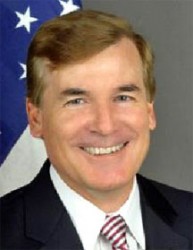Having sent a diplomatic note to the US State Department, the government yesterday challenged American Ambassador Brendt Hardt to prove that USAID has a right to go ahead with a $300 million democracy project here despite government’s objections on grounds of a lack of consultation.
“The note verbale is to the State Department. You don’t try Caesar in Caesar’s court. This note verbale goes to the State Department. It does not go to the Ambassador…he has to seriously consider what he is going to answer…what response. That is going to be seen as official US policy. Whatever they put in that note verbale in response to ours will be the US policy,” Head of the Presidential Secretariat, Dr. Roger Luncheon declared yesterday at his post-Cabinet press briefing.
It was the latest salvo from the government in a deepening row with Washington’s top diplomat here after he told Stabroek News in an exclusive interview that there was no truth in the claim that the government had not been consulted on the project and that it would go ahead notwithstanding George-town’s objections.

On November 26th, Luncheon announced that government had rejected the $300 million Leadership and Democracy (LEAD) project which, among other goals, aims to boost citizens’ engagement with local parliamentarians and improve overall governance.
The Donald Ramotar administration later said that it had no input but last Thursday Hardt said that government’s claim was “completely false” and the US embassy released a series of correspondence showing that from the start the administration was actively engaged on the project. Luncheon had even thanked the embassy for its “diligent” efforts to inform government.
Following the publication of the contents of the interview in Stabroek News, GINA reported that Luncheon sharply criticized the decision to continue with the project or aspects of it, despite strong objections by Cabinet. He said that the issue was engaging the highest levels of government in no uncertain terms.
Luncheon said that the decision to go ahead with the project was an “affront” to Guyana’s sovereignty.
Yesterday, he opined that he did not believe that the decision to go ahead with the project was a matter of US policy but of the Ambassador’s doing. “I keep insisting to my colleagues that this departure shouldn’t sully our relationship with the American government nor with USAID … I am of the firm opinion that the cabinet sees that this issue is the US Ambassador’s creation,” he said
“I do not believe it is the US government’s policy. I can’t understand why in the face of our rejection, notice of our rejection, (that he would) summon an exclusive interview and basically say Cabinet, Luncheon, Ramotar ‘screw you’. I am doing what I want to do,” he added.
He stressed that the government still holds firm to the view that it was not consulted on the project. When questioned by Stabroek News on his own correspondence to the US Ambassador acknowledging inclusion, Luncheon maintained that all correspondence showed the government’s objection while still demonstrating comradeship. “We agreed that this project was objectionable, all of the correspondence attest,” he asserted.
In a letter to US Ambassador on the project, Luncheon had stated “The Government of Guyana has noted the diligent efforts by the US authorities in Guyana to inform Guyanese counterparts of their recent proposals for a USAID program.”
Yesterday, he pointed out that government was basically handed a proposal without its input. “Cabinet recalled this project was conceived in the United States, its funding by Congress, the procurement of a contractor to implement the project, IRI, all of those steps were concluded prior to any engagement with this administration on this project and that took place in late 2012,” he said.
Questioned on the aspects of the programme that the government found objectionable, he said that the issue of public support for political parties was one. He said that Guyana’s laws do not provide for state funding moreso foreign funding to political parties. “There is nothing like that in the law or in the practice. The Americans came into this project and invited what is a profoundly sensitive issue that has not been dealt with by this government or governments as far back as the day from Independence- public support for political parties. That, indeed, represented a usurpation of our authority,” he said.
The US Ambassador has maintained that there would be no funding to political parties under the project as it goes against state policy.
Luncheon said that another area of concern was that the project would support activities for the formulation of policies that may lead to constitutional reform. Said Luncheon: “We don’t amend the constitution that way. I don’t call in America to help us to amend the constitution and activities that address constitutionally important roles and activities obviously can become part and parcel.”
However when asked if these concerns were relayed to the project head he said that government maintains the right to accept or not accept a project without giving reasons.
US embassy sources point out that the 2009 bilateral assistance agreement between Guyana and the US covers precisely the type of activities proposed through the LEAD programme.





